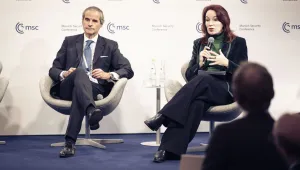Last weekend, the New York Times published a debate on whether, as a result of tension over Ukraine, the United States should cut off nuclear security cooperation with Russia. As the Times reported before the debate, Russia may be bringing nearly all of this cooperation to an end–but there are some in the United States saying the U.S. government should act to end it whether or not Russia is willing to continue. Given the deteriorating relationship between the two countries, this issue should be debated now. We are continuing the debate on Nuclear Security Matters and welcome readers to send us their thoughts.
Four out of five participants in the discussion thought continuing cooperation was a good idea. William C. Martel argued that the United States has a vital interest in engaging with Russia and would regret cutting off cooperation. Joan Rohlfing argued that the world’s ability to address nuclear threats would be greatly diminished without Russia’s cooperation. Also, the rest of the world would not take the threat of nuclear terrorism seriously if the United States and Russia were not working together. Siegfried S. Hecker said that, although Russia should be proud of the progress it has made on nuclear safety and security over the past two decades, effective nuclear security “requires constant commitment to respond and adapt to changing threats, technologies and political environment,” which “is best accomplished through collaboration; that is, sharing best practices and lessons learned, education and training, threat assessments, technology development, and emergency response.” Even David J. Kramer of Freedom House, while attacking a broad range of Russian policies, argued that although the prospects for cooperation are dim, “holding open pursuit of cooperation on nuclear security with Russia is fine as long as we do so with eyes wide open, and understand that it takes two sides to cooperate.”
One of my Belfer Center colleagues, retired Brigadier General Kevin Ryan, was the lone voice in the Times debate calling for U.S. action to suspend this cooperation. Ryan, who has spent much of his career on Russian issues and previously served as US defense attaché in Moscow, argued that the United States should suspend cooperation until the Ukraine issue is resolved for three reasons: Russia can afford to pay for its own nuclear security, the risk of nuclear material in Russia being lost or stolen is greatly diminished, and the threat of “Russian adventurism in Eastern Europe” outweighs the threat of nuclear terrorism. These arguments seems to assume that nuclear security cooperation is a favor to Russia. It isn’t. Working with Russia to reduce the threat of nuclear terrorism is in the United States’ interest.
I have addressed General Ryan's first argument—that Russia can afford to pay for its own nuclear security—in an earlier post. As I've previously written, while this is true, it applies the wrong standard for policy evaluation. The United States needs to prioritize national security decisions based on its interests, not its expectations of what other countries can afford to do. The United States should continue to encourage Russia to pay for all of its nuclear security. In the meantime, however, as long as working with Russia reduces the threat of nuclear terrorism, we should continue to pay the very modest amounts required to purchase support in alleviating the one thing that keeps President Obama “up at night.”
General Ryan also mentions that security has improved in Russia over the past twenty years. This is also true. What he does not mention is that it is still not where it needs to be to prevent theft of nuclear materials from Russian facilities. Moreover, his argument implies that security is static. ‘Now that security in Russia is better, it will stay better.’ By contrast, many of those who have worked with Russia on nuclear security believe, as Sig Hecker suggests, that without U.S. cooperation, nuclear security in Russia will get worse.
It is likely that, without continued cooperation, many of the security upgrades made to Russian nuclear facilities will erode. This issue was addressed in a 2007 Government Accountability Office report identifying that some Russian nuclear facilities might “not be financially able to maintain” U.S. “funded security upgrades.” As an example, four years after they upgraded security at one Russian nuclear facility, U.S. inspectors returned to discover that the upgrades were in a “severe state of disrepair.” The United States needed to invest another $800 thousand to fix the equipment.
The issue of how to sustain nuclear security upgrades at Russian nuclear sites has not yet been resolved. The Department of Defense’s (DOD) annual report to Congress on Cooperative Threat Reduction for fiscal year 2013 identifies that significant more work was needed to ensure that nuclear security upgrades in Russia could be sustained. Of the eight metrics DOD uses to evaluate sustainability, four categories—vulnerability assessments and system readiness tests; maintaining configuration control of security at sites; systems, processes, and procedures to ensure that site security could be effectively sustained; and ensuring that there were qualified personnel to sustain operations and maintenance of security systems—were all less than 20% of the way towards the goal of sustainably transferring responsibilities to Russia. Sustainability of training was below 40%. Sustainability of assessing security system reliability, availability, and maintenance and repair of security systems were just over 50%. The only aspect of nuclear security more than 70% towards its sustainability goal was logistics. This is further evidence that, without continued cooperation with and support from the United States, nuclear security in Russia will very likely erode.
Finally, General Ryan does not include an explanation as to why cutting off nuclear security cooperation would benefit the United States. He argues that the threat from Russia’s invasion of Ukraine outweighs the threat of nuclear terrorism. This might be true. What he doesn’t explain (and what the New York Times doesn’t explain either in framing its debate) is why the United States has to choose between addressing nuclear security or Ukraine.
The United States can pursue both nuclear security and a suitable resolution of the Ukraine crisis simultaneously. Both countries have previously demonstrated that they can disagree about some issues, while simultaneously cooperating on issues of mutual interest. As William Martel identifies in the Times debate, “the Soviet Union invaded Hungary in 1956 and Czechoslovakia in 1968. Still, both capitals saw the virtue of arms control, reaching agreements including the Test Ban Treaty of 1963, the 1967 Outer Space Treaty, SALT, ABM and maritime confidence building measures.” In other words, the United States and Russia cooperated on arms control and political issues during the Cold War, when the stakes were higher and animosity was even more vociferous.
The New York Times posed a question that created an artificial choice between securing Ukraine's territorial borders and reducing the risk of transnational threats of nuclear terrorism. History has shown that states have the capacity to do both. It is in the United States’ interests to try to do both. As Martel notes, “Despite temptations to make cooperation contingent on Moscow’s good behavior, Washington must not allow setbacks to derail broad engagement with Russia on nuclear security or a wide range of issues.” This may not be easy and the United States should approach cooperation with open eyes, but the alternatives are far worse.
Roth, Nickolas. “The United States Should Chew Gum and Walk on Nuclear Security.” November 19, 2014





